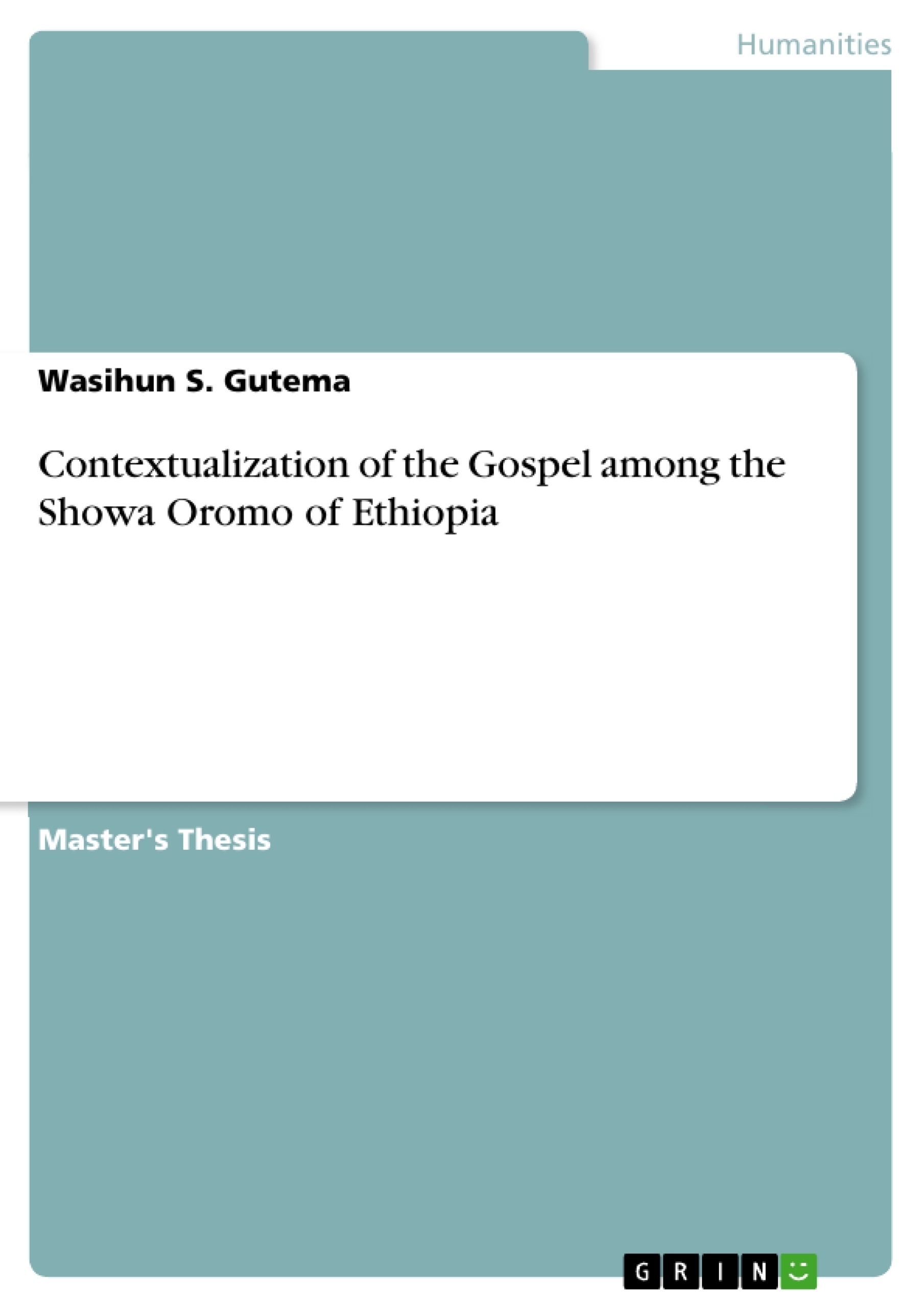
Contextualization of the Gospel among the Showa Oromo of Ethiopia
Masterarbeit, 2009
84 Seiten, Note: Pass
Leseprobe
Inhaltsverzeichnis (Table of Contents)
- Introduction and Research Methodology
- People and the context in which the Gospel is communicated
- The Failure of the Ethiopian Orthodox Church to Evangelize the Oromo of Showa/Showans
- Lessons learned from the failure of the EOC
- How to alleviate the problem
- The EECMY Approach towards Contextualizing the Gospel to the Showa Oromo
- Contextualization of their customs and religious rites
- The Irreecha/Thanks Giving. Filling with Christ
- Indigenous language and Bible translation as the means of contextualization
- Incarnational approach as means for the Contextualization of the Gospel to the Showa Oromo
- The Lutheran (EECMY) Theology of Mission and Missiology in Light of this Research Paper
Zielsetzung und Themenschwerpunkte (Objectives and Key Themes)
This research paper examines the contextualization of the Gospel amongst the Oromo people of Showa in Ethiopia. It explores the cultural and linguistic landscape of the Oromo and investigates how the gospel can be effectively communicated within their context. The research focuses on the Showa Oromo clan as a specific case study, while emphasizing that its principles are applicable to diverse cultures and can serve as a guide for anyone seeking to evangelize through cultural and linguistic sensitivity.
- The challenges faced by the Ethiopian Orthodox Church (EOC) in evangelizing the Showa Oromo due to a lack of cultural understanding and linguistic adaptation.
- The role of the Ethiopian Evangelical Church Mekane Yesus (EECMY) in contextualizing the gospel to the Showa Oromo, emphasizing the use of their language, culture, and existing religious practices.
- The significance of indigenous language and Bible translation as essential tools for effective gospel communication.
- The importance of an incarnational approach to mission, encompassing both proclamation and diaconic service, as a means of contextualizing the gospel.
- The missiology of the Lutheran Church, particularly the EECMY, and its emphasis on the church as the sent one and the active participation of all believers in mission.
Zusammenfassung der Kapitel (Chapter Summaries)
The first part of the research provides a detailed description and analysis of the Showa Oromo people and the EOC's unsuccessful evangelization strategy. It highlights the EOC's failure to acknowledge cultural nuances and preach in the Oromo language, leading to limited success. The section further analyzes the broader implications of this failure for other churches and emphasizes the importance of ecumenism and collaboration between the EOC and the EECMY to learn from each other and engage in joint mission efforts.
The second part delves into the EECMY's approach to contextualizing the gospel to the Showa Oromo. It explores how the EECMY has successfully integrated the gospel into the Oromo culture by recognizing points of contact within their traditional beliefs and practices. The research examines the EECMY's role in incorporating the Oromo thanksgiving festival, Irreecha, into Biblical Christianity and its use of the traditional Oromo name for God, Waaqayyo, in evangelization efforts. It also highlights the importance of translating the Bible into the Oromo language and adapting pre-Christian Oromo terms into evangelical Christianity. The section concludes by discussing the EECMY's incarnational ministry, which involves a holistic approach to mission.
The third part of the paper focuses on the missiology of the Lutheran Church, specifically the EECMY. It explains the role of the EECMY in mission and explores various Lutheran mission theories. This section emphasizes that mission is not solely a human endeavor but a divine calling, where all believers participate in mission through discipleship. It also highlights the inseparable nature of proclamation and diaconic service in mission work.
Schlüsselwörter (Keywords)
This research paper focuses on the contextualization of the gospel, Oromo culture, language, and mission. Key themes include the Ethiopian Orthodox Church (EOC), Ethiopian Evangelical Church Mekane Yesus (EECMY), indigenous language, Bible translation, incarnational ministry, Lutheran missiology, and ecumenism. The research examines the challenges and opportunities presented by the cultural and linguistic context of the Showa Oromo in evangelization efforts.
Details
- Titel
- Contextualization of the Gospel among the Showa Oromo of Ethiopia
- Veranstaltung
- Final Research paper
- Note
- Pass
- Autor
- Wasihun S. Gutema (Autor:in)
- Erscheinungsjahr
- 2009
- Seiten
- 84
- Katalognummer
- V337354
- ISBN (eBook)
- 9783668375734
- ISBN (Buch)
- 9783668375741
- Dateigröße
- 666 KB
- Sprache
- Englisch
- Schlagworte
- contextualization gospel showa oromo ethiopia
- Produktsicherheit
- GRIN Publishing GmbH
- Preis (Ebook)
- US$ 29,99
- Preis (Book)
- US$ 56,99
- Arbeit zitieren
- Wasihun S. Gutema (Autor:in), 2009, Contextualization of the Gospel among the Showa Oromo of Ethiopia, München, Page::Imprint:: GRINVerlagOHG, https://www.diplomarbeiten24.de/document/337354
- Autor werden
- Ihre Optionen
- Vertriebskanäle
- Premium Services
- Autorenprofil
- Textarten und Formate
- Services für Verlage, Hochschulen, Unternehmen

- © GRIN Publishing GmbH.
- Alle Inhalte urheberrechtlich geschützt. Kopieren und verbreiten untersagt.
- info@grin.com
- AGB
- Open Publishing
Der GRIN Verlag hat sich seit 1998 auf die Veröffentlichung akademischer eBooks und Bücher spezialisiert. Der GRIN Verlag steht damit als erstes Unternehmen für User Generated Quality Content. Die Verlagsseiten GRIN.com, Hausarbeiten.de und Diplomarbeiten24 bieten für Hochschullehrer, Absolventen und Studenten die ideale Plattform, wissenschaftliche Texte wie Hausarbeiten, Referate, Bachelorarbeiten, Masterarbeiten, Diplomarbeiten, Dissertationen und wissenschaftliche Aufsätze einem breiten Publikum zu präsentieren.
Kostenfreie Veröffentlichung: Hausarbeit, Bachelorarbeit, Diplomarbeit, Dissertation, Masterarbeit, Interpretation oder Referat jetzt veröffentlichen!
- GRIN Verlag GmbH
-
- Nymphenburger Str. 86
- 80636
- Munich, Deutschland
- +49 89-550559-0
- +49 89-550559-10
- info@grin.com
-









